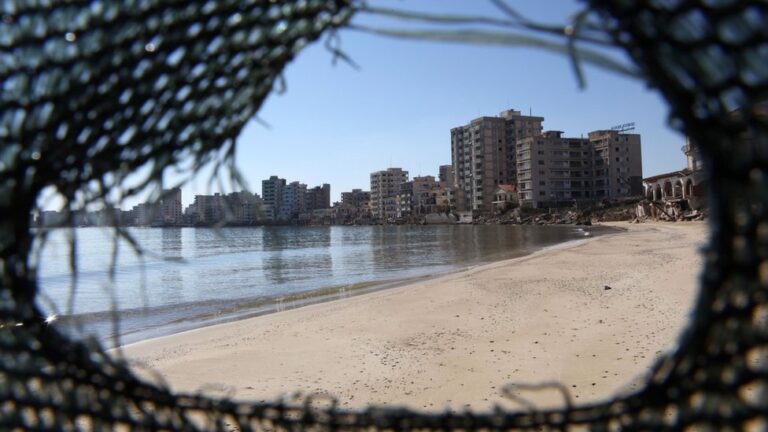
Cypriot ghost town of Varoshia.
The United Nations Security Council has expressed deep concern over developments following Turkey's decision to "open the Varosha beach," calling on Ankara to reverse the decision announced on October 6 to partially open the Cypriot ghost town.
In his statement, the President of the Security Council reaffirmed the Security Council's commitment to Resolutions 550 and 789. In addition, he called on the Greek Cypriots and Turkish Cypriots, as well as the guaranteeing forces, to start a dialogue immediately after the illegal elections that will soon take place in the occupied territories.
It is noted that Ambassador Andreas Mavrogiannis expressed his satisfaction immediately after the announcement.
Statement by the President of the Security Council: "It further reaffirmed the status of Varosha as set out in previous Council resolutions — including resolutions 550 (1984) and 789 (1992) — and reiterated that no actions should be carried out in relation to Varosha that are not in accordance with those texts."
The Security Council reiterated that no action should be taken against Varosha which do not comply with these decisions.
"Expressing concern over Turkey’s recently announced plan to open the coastline of Varosha, a city on the eastern edge of Cyprus, the Security Council called today for a reversal of that decision and for the parties to avoid any unilateral action that could raise tensions on the island," the statement began.
"Issuing presidential statement S/PRST/2020/9 — presented by Dmitry A. Polyanskiy (Russian Federation), Council President for October — the 15-nation organ reaffirmed its commitment to an enduring, comprehensive and just settlement, in accordance with the wishes of the Cypriot people, and based on a bicommunal, bizonal federation with political equality," the statement continued.
"Stressing the importance of fully respecting and implementing its resolutions, the Council called upon both Cypriot sides, as well as the guarantor Powers, to engage in constructive dialogue with a sense of urgency following the electoral process in the Turkish Cypriot community. It also reiterated its support for the Secretary-General’s intention to convene a meeting, as previously agreed, between the Turkish Cypriot and Greek Cypriot leaders," the statement concluded.
The Turkish Foreign Ministry hit back at the United Nations Security Council resolutions though and said the international community should take into account the events on the island and "not the propaganda of the Greek Cypriots."
"Therefore, the claim that this resolution is contrary to the decisions of the UN Security Council does not reflect reality. The international community must take into account the events on the island and not the propaganda of the Greek Cypriot administration and evaluate the developments without prejudice," the Turkish Foreign Ministry said in a statement.
He concludes by saying that "the defense of the status quo will not benefit either the two communities that are co-owners of the island of Cyprus, nor will it contribute to the resolution of the Cyprus problem."
Varosha, a southern suburb of the city of Famagusta, has been a ghost town since the illegal invasion that partitioned the eastern Mediterranean island along ceasefire lines into an occupied Turkish side and the Republic of Cyprus.
The move will anger Greek Cypriots, 39,000 of whom once lived in Varosha before fleeing advancing Turkish forces 46 years ago, and stoke tensions between the two sides.
Greek Cypriots today live mainly in the south of the island, a republic that is in the European Union and recognised by every country in the world except Turkey. Recognised only by Turkey, the "Turkish Republic of Northern Cyprus" is considered by the United Nations to be part of the Republic of Cyprus and an illegal entity.
The Turkish Army maintains a large force in Northern Cyprus. While its presence is supported and approved by the TRNC government, it is regarded as an occupational force by the Republic of Cyprus, the European Union as a whole, and the international community. The TRNC has been denounced in several United Nations Security Council resolutions.
Since Turkey illegally invaded northern Cyprus, tens of thousands of Turkish colonisers have moved from Turkey to the island, mostly living in homes formerly belonging to Greek Cypriots.
Talks on unification between the two sides in recent years have made no significant progress, and tensions have been rising in the region due to Turkey’s attempts to steal hydrocarbon exploration rights off the coast of the island.